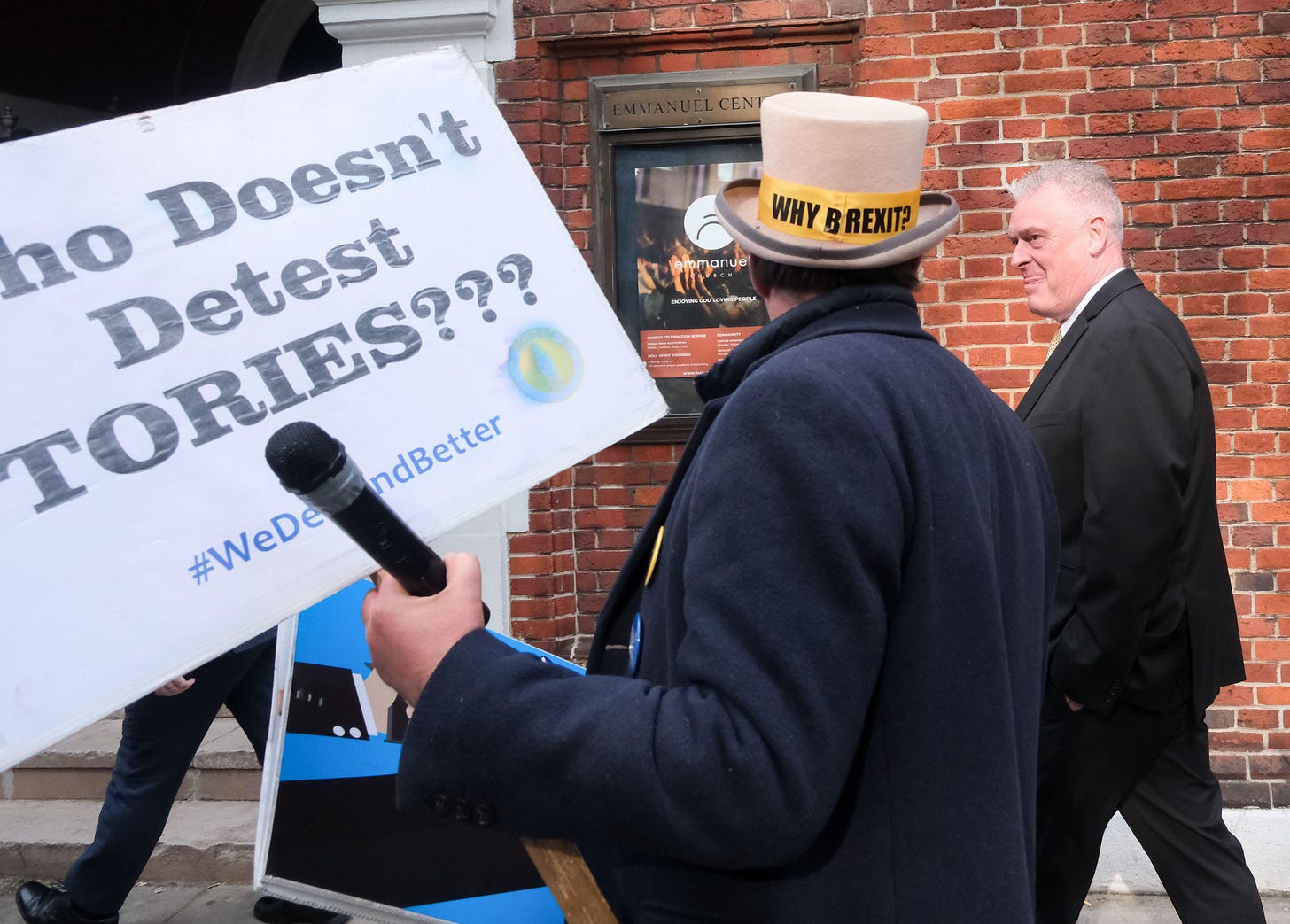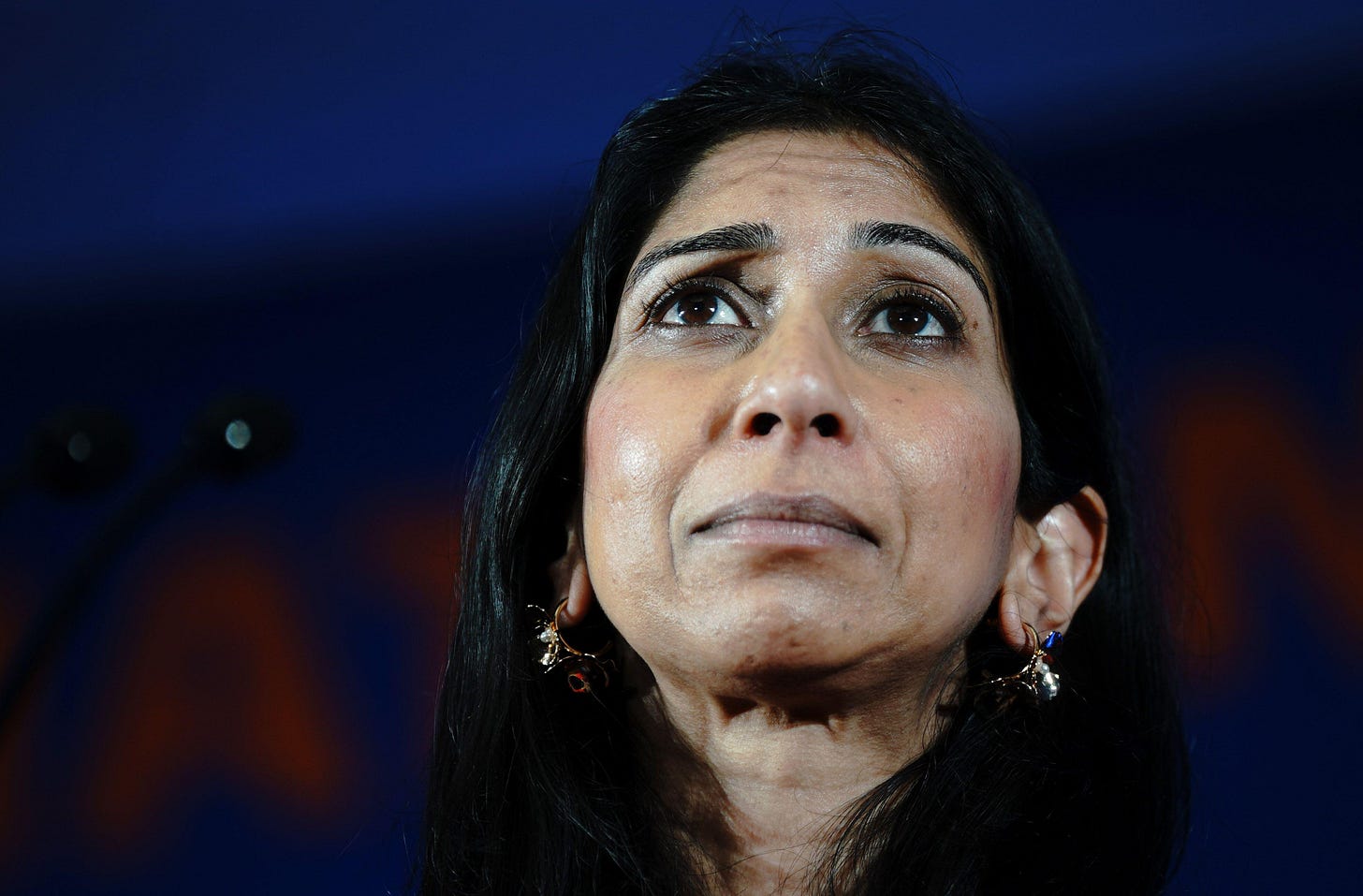The 'National Conservatives' and the Far-Right Pipeline Fuelling Rishi Sunak's Party
The Conservative Party's embrace of a fringe right-wing movement is a worrying sign of things to come, reports Josh White
Walking into the National Conservatism conference this week was a truly surreal experience. Outside, the top-hatted anti-Brexit campaigner Steve Bray had set up his sound system to blast ear-splitting music at the delegates entering the building, while inside, right-wing think tanks and conspiracist publications, such as the far-right magazine The Epoch Times, pushed their wares onto the crowds.
Elsewhere orthodox Conservatives were handing out a pamphlet attacking Net Zero, the Heritage Foundation was distributing pamphlets on gender identity theory, while the Danube Institute was kind enough to hand out stress balls.
Addressing delegates, the commentator Douglas Murray said that just because Germany had “mucked up” its own version of nationalism twice doesn’t mean Britain should be sheepish about following their lead. Later the historian David Starkey claimed that the left was “jealous” of the “moral primacy of the Holocaust” and wanted to replace it with slavery amid a supposed bid to destroy “white culture”.
However, what was most striking about the National Conservatism conference was that most of the actual dominant concerns of UK voters were not even on the programme. Most notably, the burning issue of cost-of-living was absent from most of the speeches.
This may not have bothered most of the attendees. A standard ticket to National Conservatism cost £115 (subsidised), while VIP tickets went for up to £2,500 a head and the rate for a Beaconsfield table of 10 VIPs at the conference was £20,000.
Instead of focusing on the issue of surging living costs, the conference instead focused on such lofty topics as national identity and faith. While housing did get some attention, it was as nothing compared to the large amount of time spent on declining birth-rates and mass immigration.
There were occasional moments of clarity. Writer Ed West claimed middle-class conservatives wanting to keep house prices high by resisting housebuilding will have their “grandkids listening to Novara Media and voting for the Green Party”.
The conference had rejected Novara’s application for a press pass. So no one had to worry about a response to West’s comments.
Culture, Not Economics

Overall the emphasis was very much on culture, not economics. However, when the agenda finally did turn to the economy, the event platformed speakers who were preoccupied with tax incentives for married couples to have children.
Many people at the conference seemed to favour a mix of low-taxation, light regulation, state aid for industry and high tariffs on imports. Others wanted something akin to right-wing social democracy or distributism.
This would be a break with Thatcher’s aggressive brand of neoliberalism. Danube Institute President John O’Sullivan was keen to defend Thatcher’s record (not surprising given he was her speechwriter).
A populist culture war strategy can be used to defend free-market policies or overhaul them. This is why there were big divisions over trade policy. Free traders such as Jacob Rees-Mogg were at odds with protectionists like Trumpian US Senator JD Vance. This is an age-old split on the right.
However, the real problem for National Conservatism is that there is no cultural solution to a dysfunctional and stagnant economy. Without a serious economic programme, the right has little to offer most the country.
Culture Wars Not Actual Wars
There were similar divisions on foreign policy with some attendees sporting Ukraine flags in their lapels, while others preferred the crest of the Hapsburg monarchy.
The foreign policy panel on day two featured Richard Dearlove, former head of MI6, speaking alongside Michael Anton, former US national security official, and LSE emeritus professor Gwythian Prins.
All three speakers advocated a tougher stance against China to defend Western interests, while just two stressed the threat of Russia to European stability.
The feel of the foreign policy discussion was very much reminiscent of Cold War realism. But it’s clear that the audience was not totally enthused by the idea of taking about Russia or China.
After the discussion, one audience member turned to me and said: “That was the most neocon panel we’ve had all day!” Needless to say, he was not wearing a Ukraine flag in his lapel.
The challenge for the National Conservatives is that while they have previously pledged to oppose ‘imperialism and globalism’ that was in 2019. Russia had not invaded Ukraine and the world had not entered a new era of danger.
Many on the right are opposed to Western support to Ukraine, because they accept Russian claims of historical grievances. However, this is an untenable position for any political movement wanting to court power in the UK, which the National Conservatives do.
Anti-Chinese sentiment may be a more useful solvent for holding together this coalition of laptop bombardiers and Trumpian isolationists. Otherwise, the Russia-Ukraine war could well derail this project for a new brand of conservatism.
Far-Right Pipeline
Overall though, National Conservatism was mostly preoccupied with one particular social issue: gender. Every other speaker made an allusion to so-called ‘gender ideology’ or how to define women. It was almost as regular as the constant attacks on all things deemed ‘woke’.
Conservative feminists like Louise Perry and Mary Harrington were more than welcome at the conference because they take the ‘gender critical’ position. But the cultural tone had really been set early on by Conservative MPs like Miriam Cates.
Cates invoked the concept of “cultural Marxism”, which is associated with antisemitism and the far-right, blaming it for “destroying our children’s souls”. The central focus of her speech was on the need to reverse declining birth-rates in the UK.
This is straight out of the Meloni-Orbán playbook, which was appropriate. Both Hungarian Prime Minister Viktor Orbán and Italian Prime Minister Giorgia Meloni have spoken at the conference in the past.
Another Conservative MP Danny Kruger claimed that Western civilisation is under threat from a “new religion”, which he characterised as a mix of “Marxism, narcissism and paganism” apparently conforming to the fantasies of John Lennon.
Home Secretary Suella Braverman was more careful than she has been in the past to avoid the trope of cultural Marxism, but fell back on phrases like political correctness.
However, Braverman also got the most applause of the day for simply saying that “100% of women do not have a penis”. Most people at the conference were mobilised by the cause of opposing trans rights, but this may have opened them up to the radical right.
The big risk for the Conservative Party is that National Conservatism appears to be a pipeline between the far-right and the mainstream right. However, the flow of ideas may not be one way. As a forum for right-wing insiders to network with conservative outsiders, the real danger isn’t the conference itslef, but what comes after it.


